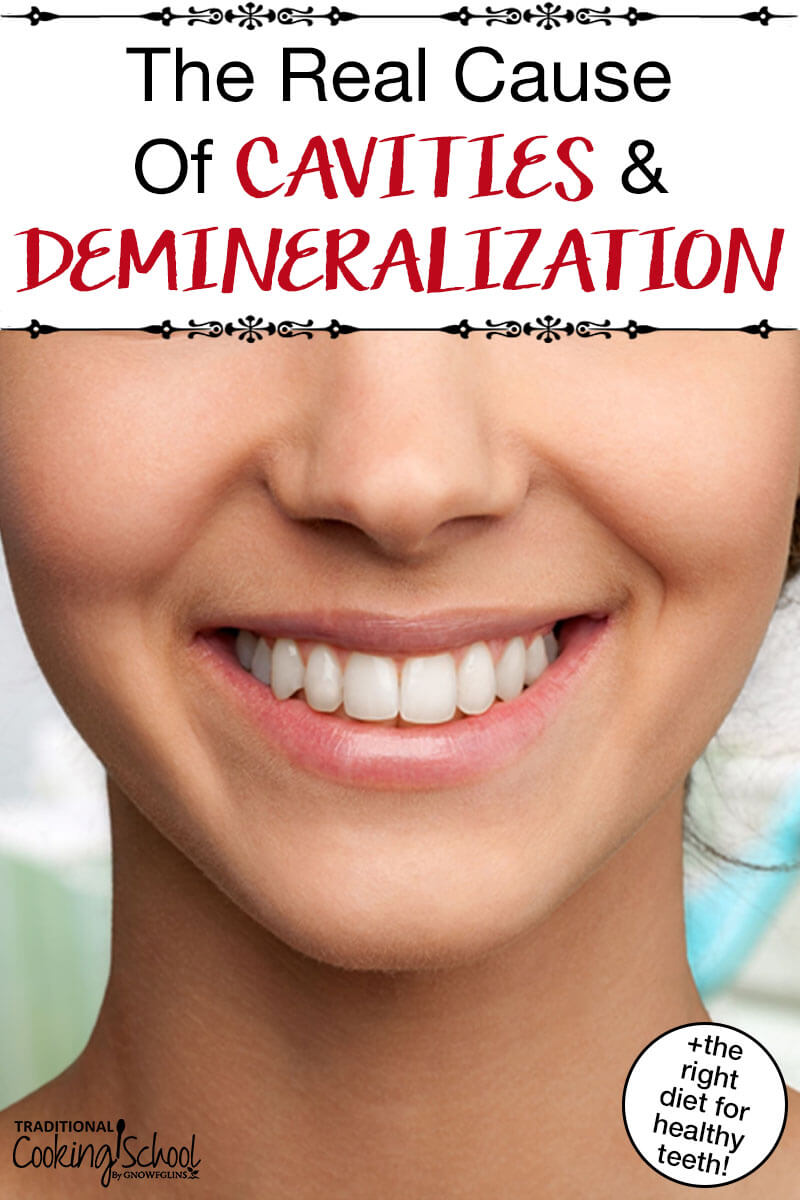
I never had a single cavity…
Until after becoming a mother.
Then, one hot June afternoon, I walked out of my dentist’s office with a numb mouth and $1,200 less in my bank account. I had 4 cavities filled. 🙁
My OBGYN never mentioned eating nutrient-dense foods to replenish my body during and after pregnancy. It was a foreign concept to me, too. Truth be told, I just didn’t know how to prepare my food so that my body could absorb all the vitamins and minerals it needed.
I didn’t know that there is a right diet for healthy teeth. And I certainly didn’t know the real cause of cavities.
Instead, I thought that regular brushing, flossing, dental cleanings, and flouride treatments prevented cavities and maintained good oral health. I believed that sugar caused cavities — or rather, bacteria growing in the mouth because of sugar.
Now I know differently. And I want you to know differently, too.
The Bacterial Theory Of Tooth Decay
According to the American Dental Association (ADA), sugar in the diet feeds bacteria in the mouth and causes tooth decay. This is known as the bacterial theory of tooth decay:
Tooth decay occurs when foods containing carbohydrates (sugars and starches) such as milk, pop, raisins, cakes or candy are frequently left on the teeth. Bacteria that live in the mouth thrive on these foods, producing acids as a result. Over a period of time, these acids destroy tooth enamel, resulting in tooth decay. (Source.)
Their “remedy” for this is brushing and flossing at least twice a day, preferably after every meal, and regular dental cleanings, which include x-rays and fluoride treatments.
Brushing & Flossing Are Not The Answer
If you think sugar (including candy, sodas, and desserts) or not brushing and flossing correctly are the cause of cavities, you’re wrong. Well… partly wrong. (Hint: Sugar doesn’t cause tooth decay in the way you think.)
And if brushing and flossing are so effective, why do over 85% of Americans, aged 20 to over 60, experience tooth decay (source)?
Decades ago, the ADA acknowledged that the bacterial theory of tooth decay was false:
In previous reports we have stated that after a study of the microorganisms found in caries and in pyorrhea we attempted to reproduce dental lesions both by feeding and by inoculation with these various bacteria. In no case did we succeed in establishing dental disease by these means. It was only when we took up the study of foods that we obtained results. — Percy Howe, DDS presentation reprinted in The Journal American Dental Association, 1923 (Source.)
Even under the most ideal circumstances, bacteria could not cause tooth decay!
The Real Cause Of Cavities: The Proteolysis-Chelation Theory
So if it’s not sugar or bacteria, if it’s not improper brushing and flossing…
What is the REAL cause of cavities and tooth decay?
In 1972, Dr. Albert Schatz theorized that a combination of 3 factors — diet, trace elements, and hormonal balance — can trigger the enzymes and tooth mineral chelation (loss of minerals) that result in tooth decay.
This theory is known as the proteolysis-chelation theory. In other words, teeth decay without minerals. (Source.)
Remember this… we’ll come back to it:
Tooth decay is caused by a deficiency of vitamins, minerals, and other nutrients that the body needs to build healthy teeth. It also results from eating, drinking, or exposure to too many life-depleting substances. (Source).
Simply put, there are 4 main causes of tooth decay. Research from Dr. Weston A. Price, Dr. Edward Mellanby, and Ramiel Nagel proves these 4 causes:
- A mineral-deficient diet — specifically calcium, magnesium, and phosphorus
- A diet deficient in fat-soluble vitamins — vitamins A, D, E, and K2
- Too many foods containing phytates or phytic acid — non-soaked/non-sprouted/non-fermented nuts, seeds, grains, and legumes
- Too many processed foods, including sugar
As you can plainly see, sugar is only 25% of the problem — yet it is given 100% of the attention!
Have you ever heard of this proteolysis-chelation theory? If you haven’t, that’s because it was quashed in 1940s. The American Dental Association voted to silence the notion that food and environmental factors caused cavities. Instead, they promoted the bacterial theory of tooth decay — despite contrary evidence.
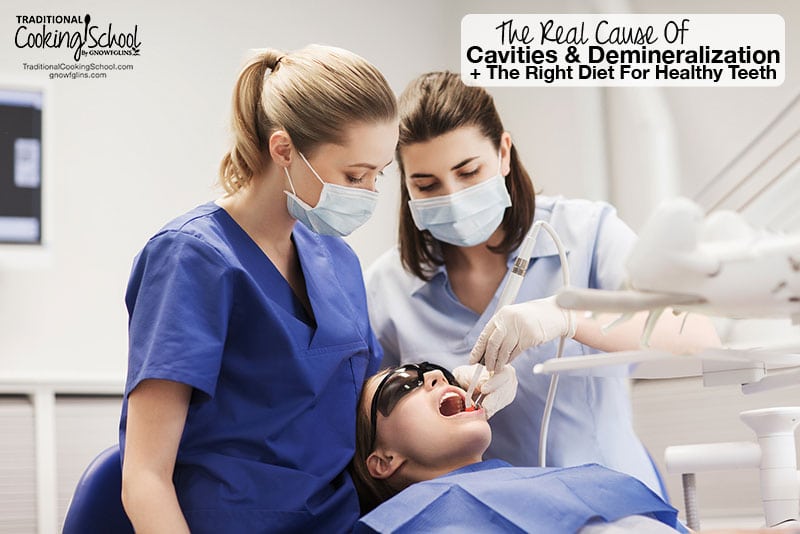
Drill, Fill, & Bill — Money Over Science
Tooth decay is a billion dollar industry.
There are over 30,000,000 root canals — one of the most expensive oral procedures — performed each year in the United States (source).
42% of children ages 2 to 11 have dental caries (source). 92% of adults ages 20 to 64 have or have had dental caries in their permanent teeth (source).
Once too many teeth have been capped, filled, crowned, root canaled, or pulled, the inevitable occurs… And false teeth cost thousands of dollars.
We’re convinced it’s a lack of brushing, flossing, and fluoride — while the dental industry (and ADA) continues to line its pockets with billions of dollars from our rotting teeth!
Of course they won’t tell us the real cause of cavities or the right diet for healthy teeth!
So we go on believing the lie that we’re not brushing and flossing enough or using the right brand of toothpaste or mouthwash. We continue to visit our dentists bi-annually for x-rays, cleanings, and fillings. We are “drilled, filled, and billed”. And when none of that works, we have all our teeth removed and replaced with an expensive set of fake ones.
There’s no money for dentists in teaching us to prevent tooth decay through good nutrition.
We’ll learn the right diet for healthy teeth soon, but first, let’s explore demineralization.
3 Paths To Demineralization
A mineral-deficient body must somehow get minerals to the most important parts of the body: the brain, heart, and bones. The body cannot survive without these parts, yet it can survive without teeth.
So the body causes the calcium and phosphorus in tooth enamel to migrate out of the teeth to the places it is most necessary. And this is demineralization. (Source.)
There are 3 paths to demineralization, and it’s likely that we’re following at least 2 of them.
#1 — Weak Tooth Enamel
First, weak tooth enamel is passed down through generations. As one generation makes poor food choices, their bodies become depleted. Then they have children. These children are born at a disadvantage — with weakened enamel and mineral deficiencies — because their parents did not eat an ideal diet. (Source.)
What happens when this poor food selection occurs generation after generation? Each subsequent generation’s oral health becomes worse and worse as minerals are constantly depleted and never restored.
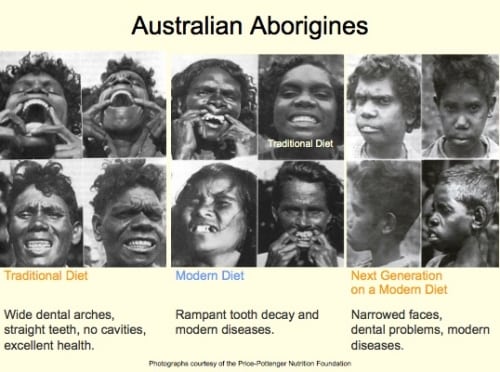
#2 — Nutrient-Deficient Diet
Second, demineralization occurs when the diet lacks both minerals AND fat-soluble vitamins.
In the 1930s, Dr. Weston A. Price traveled the globe to study the dental health of indigenous people groups and their modern-day counterparts. (He wrote his findings in a fascinating book called Nutrition and Physical Degeneration. In my opinion, this book should be required reading for ALL medical doctors and dentists.)
To summarize, Dr. Price discovered that indigenous peoples, with diets high in minerals and fat- and water-soluble vitamins, were remarkably immune to tooth decay.
In contrast, individuals of the same ethnic background who had left their indigenous lifestyle, joined modern society, and adopted modern, processed foods had abnormally high rates of tooth decay.
Dr. Price studied many groups in various geographic regions, including the Inuit, Australian Aborigines, the Swiss, and remote tribes in Africa. His findings were the same no matter where he went.
The common factor? Fat-soluble vitamins and mineral-rich foods.
Indigenous diets contained exponentially more minerals (like calcium and phosphorus), more fat-soluble vitamins (A, D, E, K2), and more water-soluble vitamins (B, C). Conversely, those eating modern diets, consisting of white flour, vegetable oils, canned foods, and refined sugars, experienced rampant tooth decay and loss.
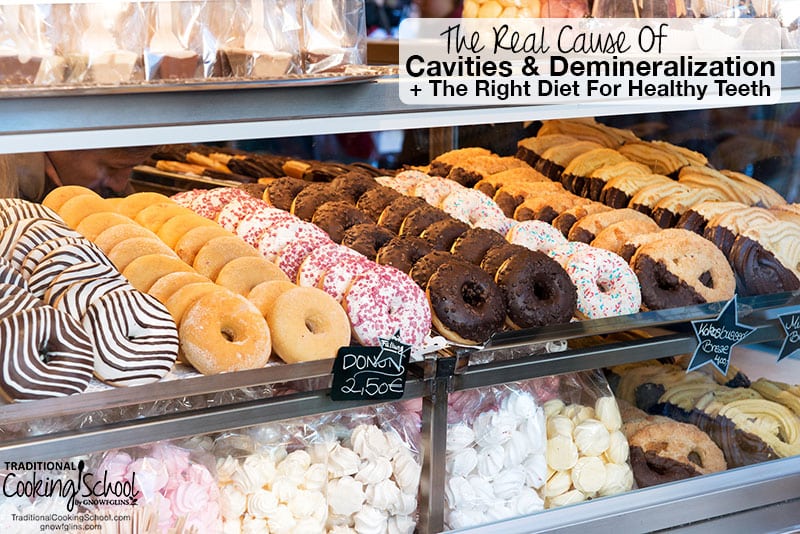
#3 — Demineralizing Food, Drink, & Substances
Remember this earlier quote?
Tooth decay is caused by a deficiency of vitamins, minerals, and other nutrients that the body needs to build healthy teeth. It also results from eating, drinking, or exposure to too many life-depleting substances. (Source).
The third path to demineralization is eating, drinking, and exposure to too many life-depleting substances. These include:
- Sugar — including high fructose corn syrup, white sugar, brown sugar, organic sugar, cane juice, coconut sugar, maple syrup, honey, jams, and jellies
- Flour & Grains — especially non-soaked, non-sprouted, or non-soured grains. If you are working to heal tooth decay, you should avoid all grains and flour.
- Vegetable Oils — including canola, safflower, soybean, peanut, cottonseed, Crisco, and margarine
- Junk food, boxed foods, canned foods, and fast food — even those labeled “organic”
- Coffee
- Soy products
- CAFO-raised animal products, including organic and pasteurized milk
- Non-soaked nuts and seeds
- Soft drinks
- “White” foods: white flour, white sugar, white (iodized) salt, white potatoes, white rice
- Artificial flavors and colors
- Alcohol, cigarettes, and drugs
- Pharmaceuticals and vaccines
(Take notice! The foods that lead to tooth decay are the same foods that compromise your immune system and make your thyroid sick.)
These foods actually leach minerals from your body and cause deficiencies. Even “healthy” foods like raw nuts and seeds contain phytic acid which blocks the body from absorbing minerals.
It simply isn’t enough to eliminate demineralizing foods from one’s diet, however. Not if you want to heal or prevent tooth decay. We must replace those foods with an abundance of nutrient-dense foods that will stop and reverse tooth decay.
These foods have been shown time and again to heal cavities and improve dental health!
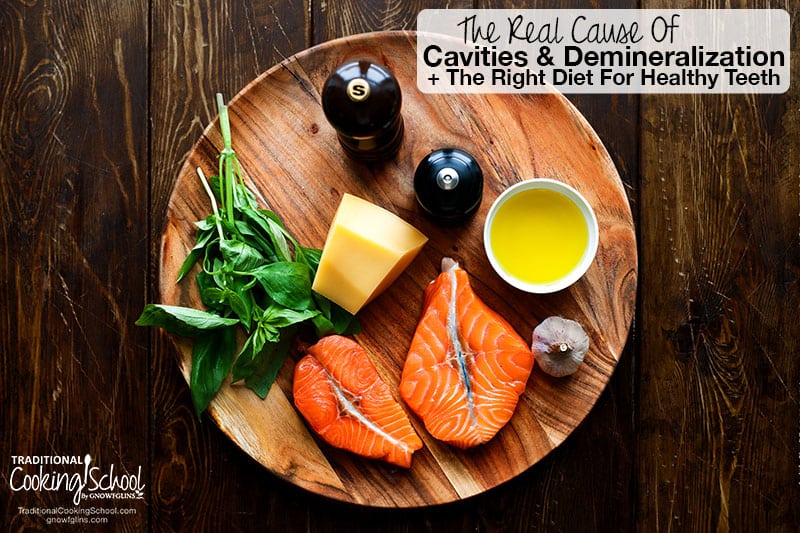
The Right Diet For Healthy Teeth
Fat-soluble vitamins and minerals are the keys to the door of oral health. By eating foods rich in fat-soluble vitamins and minerals, you provide your entire body with the tools it needs for hormone balance, proper enzymatic function, and overall good health.
Once again, the foods we must eat for healthy teeth are among the top nutrient-dense foods and the foods that nourish our thyroids.
#1 — Raw Grass-Fed Dairy
Raw milk, yogurt, and kefir are full of enzymes, calcium, and fat-soluble activators from the grass. Learn 7 more little-known facts about raw milk, plus questions to ask your farmer if you’re trying to source raw milk.
Also, learn how to make thick raw milk yogurt (here’s how!) and kefir (here’s how!).
Raw and aged cheeses have even more B and C vitamins than raw milk, thanks to fermentation! They are also full of enzymes, minerals, and fat-soluble vitamins including Activator X (source).
Get started with our 15 Easy Raw Cheese Recipes! Or dive into the world of cheese in our Cultured Dairy and Cheesemaking eCourse.
Butter, cream, and ghee are are some of the highest food sources of Dr. Price’s “Activator X” — what we now know as vitamin K2 (source). Did you know that a K2 deficiency causes sensitive teeth (source)? ONLY grass-fed butter, cream, and ghee contain high amounts of vitamin K2.
Here’s how to make your own cultured butter.
Wild-Caught Fish & Pastured Animal Foods
Bone broth is FULL of minerals, especially calcium and phosphorus, from the beef, pig, lamb, or chicken bones and feet. Add veggie scraps for even more minerals.
Check out our basic bone broth recipe, plus 5 ways to make your broth more exciting.
Bone marrow has LOTS of essential minerals, like calcium, phosphorus, iron, zinc, and MORE — plus loads of fat-soluble vitamins (source). Learn how to prepare it here!
Liver and other organ meats are loaded with all of the fat-soluble activators (A, D, E, K2), trace minerals, and B vitamins. Definitely part of the right diet for healthy teeth! (Here’s how to eat it without gagging.)
Wild-caught seafood and fish eggs were prevalent in traditional diets and now sadly lack in ours. These foods are so nutrient-dense that they were often reserved for pregnant and nursing mothers!
Pastured animal meats and eggs contain all the B vitamins and fat-soluble activators, plus trace minerals.
Pastured and wild-caught animal fats include tallow, lard, goose and duck fat, seal fat, and whale blubber — all FULL of fat-soluble vitamins. Traditional diets utilized some, if not all, of these foods, depending on location.
Today, fermented cod liver oil is a rich source of tooth-healing vitamins A, D, and K2, and both Dr. Price and Rami Nagiel recommend it in their tooth-healing protocols.
Mineral-Rich Foods
Quality salt is full of trace minerals to replenish your body’s mineral stores — unlike iodized table salt (one of the “white” foods mentioned earlier). (Read about The Problems With Table Salt + The Different Types Of Mineral-Rich Salts.)
Green vegetables, rich in vitamin C, B vitamins, calcium, magnesium, potassium, and more trace minerals, should not be overlooked in any tooth-healing diet.
Can You Really Heal Tooth Decay?
Yes!
I’ve personally experienced this, and several of our online friends have similar testimonies. We’re all doing it the same way — with nourishing foods full of minerals and fat-soluble vitamins!
Read Kimi’s story, Heather’s story, and Katie’s story (with x-ray proof!).
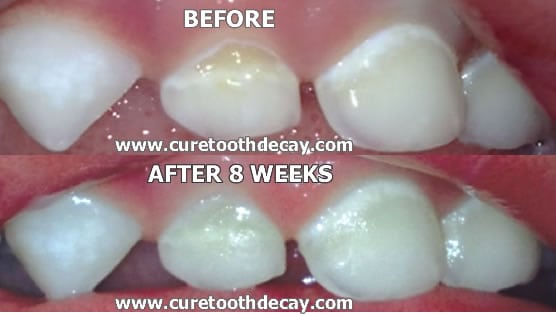
To heal tooth decay, you must eliminate the foods and substances that cause demineralization and eat the right diet for healthy teeth. It is possible to really heal sensitivity, cavities, and even infected teeth, despite the myths claiming otherwise. There is no longer a need for drilling, filling, and billing!
Learn More About The Right Diet For Healthy Teeth:
- Cure Tooth Decay: Heal and Prevent Cavities with Nutrition by Rami Nagel (The full plan for healing cavities is in this book!)
- Nutrition and Physical Degeneration by Dr. Weston A. Price
- Mercury Detoxification & Healing Cavities Naturally
- 7 Benefits Of Liver + How To Eat It Without Gagging
- Vitamin K2 and the Calcium Paradox: How a Little-Known Vitamin Could Save Your Life by Kate Rheaume-Bleue
Did you know the real cause of cavities? Are you eating the right diet for healthy teeth? Have you ever healed tooth decay?
We only recommend products and services we wholeheartedly endorse. This post may contain special links through which we earn a small commission if you make a purchase (though your price is the same).


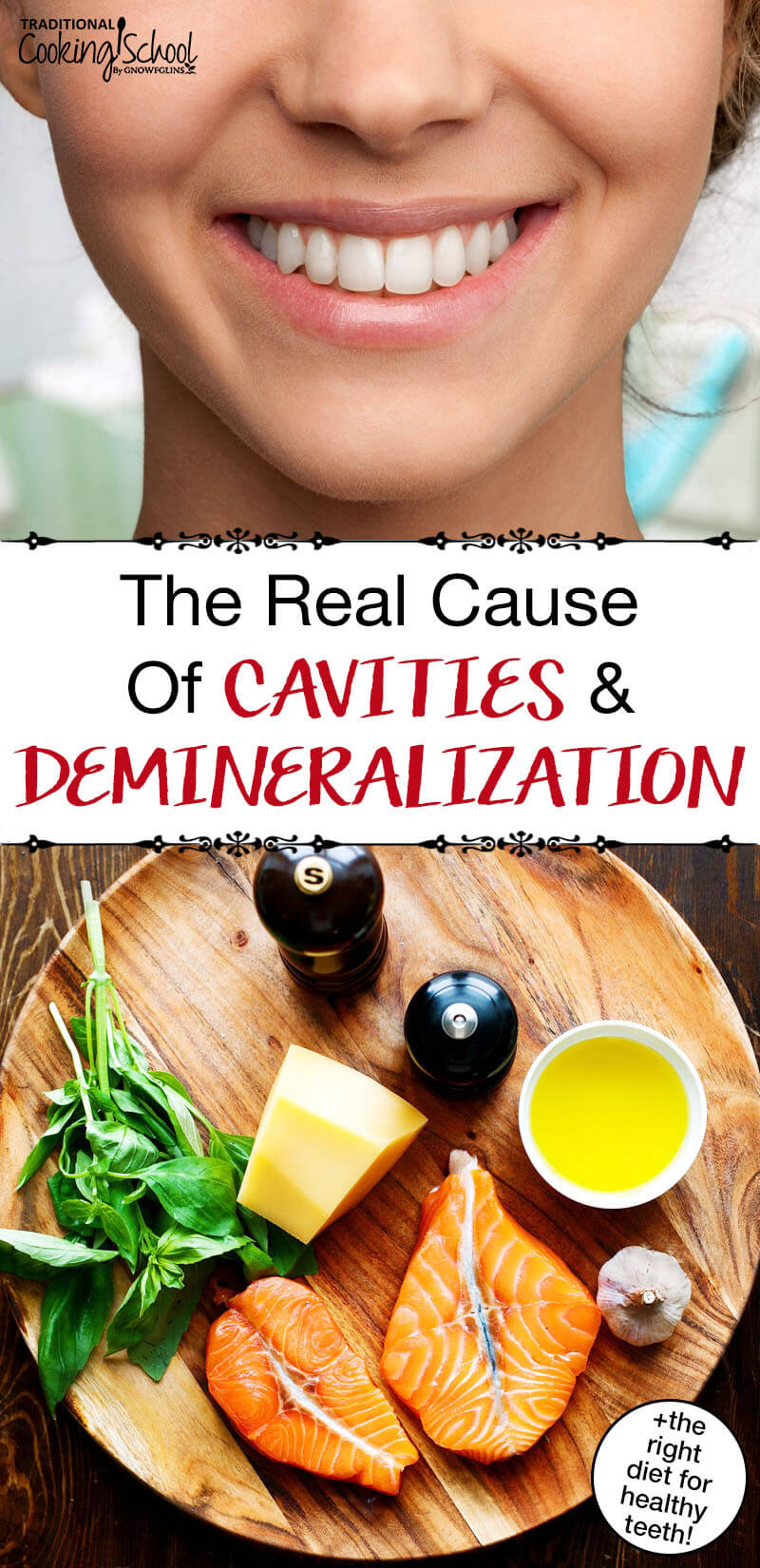
Great information, very informative! Thank you! I’ve struggled with cavities my entire life. I’m 23 and have a filling in almost every tooth and would have probably needed a crown soon if I didnt learn this a few months back. Thanks for saving me from further procedures! I wish I grew up knowing this info! Pinning this now ?
So sorry to hear about your dental struggles! I don’t believe it’s ever too late to begin incorporating the fat-soluble vitamins and minerals into your diet to reverse the damage!
This is valuable information. A bit depressing though as I actually thought I was eating healthier but see even organic foods can be a source of tooth decay. I guess I will do better once I can grow my own foods.
Indeed, Danielle, “organic” is not synonymous with “healthy”, as many often think.
This is a good article, but I think that the hormonal balance aspect of tooth decay is often overlooked. I have been eating this way for years, doing everything “right”, and I have a few cavities that are not healing. My teeth are translucent at the tips and sensitive. But I know that my hormones are way out of whack. We need more information on those stubborn cases where food is not enough. Want to do a follow-up article to tackle it, Lindsey?
Bernadette, I’m honestly not sure I’m qualified to write an article on hormones and their relationship to tooth decay. I certainly am open to learning more! As with any sort of decay or inflammation in our bodies, our hormones are often at the root of the problem. Whether or not we know the science behind how hormone imbalance contributes to tooth decay or not, I feel very strongly that finding that balance will lead to homeostasis throughout the body — including the mouth!
Hormones dont just go wacky, there is a root cause. We wont balance them till we discover that root n resolve it. Dr. Pompa is a chiro with an online presence. He talks about this methodology in depth. Great reading, pricey to apply unfortunately.
This is true… there’s always a root cause. I recommend working with a naturopath or functional medicine doctor to determine the root cause of any imbalance.
Hi Wardee,
On this topic, I’d like to share my experience. I’m a 51 year old woman married to a retired nutritionist. We eat 100% organic. I bake my own bread with whole grains and cook everything from scratch.
Sometime in Dec. 2016, I experienced some pain while biting on some crusty bread. I went to see my dentist who took an X-ray of the area. She anounced I had a abscess above an otherwise healthy tooth that would have to be removed. She recommended I have a root canal. My husband, who came with me, refused as he is against root canals.
We went home and I started a regimen of beta glucan (1400 mg a day), L-glutamine (4,000 mg a day) and L-lysine (2,000 mg a day), various supplements including fish oil and vitamin C, oil pulling (with coconut oil) twice a day, ginger tea daily (20 oz) made from freshly grated organic ginger root, and juicing made at home with organic veggies and fruit every other day.
Beta glucan is a powerful immune booster also used to cure cancer in larger doses.
It is now March 20th, I have no pain whatsoever and I still have my tooth.
I hope this info is useful.
Sybil G.
Thank you for sharing your experience, Sybil! Glad to hear you’re not in pain anymore!
There are other foods rich in K2. See Chris Masterjohns masterful Ultimate Vitamin K Resource, at his website. Free, incredible.
Thx for this concise summary of all thats out there on dental health, naturally and for good.
Thanks!
Another mineral high mineral food is SEAWEED or sea vegeatables, as we should think of them, eating one daily. Iodine, which most have little source of, but other needed minerals too. We eat dulse flakes in oatmeal, on salads, kombu strands in soups n in beans and kelp powder in entreés and smoothies. Kids love dulse flakes plain in spoon! We also use nori sheets for sushi rools and for snacking on. Seaweed is good in ur daily cuppa…BROTH that is lol
Definitely, seaweed is high in iodine. It’s also one of the Top 7 Foods That Nourish Your Thyroid, which was published in January. Did you catch that article, Helene?
Excellent article, thank you! I’ve been using oral probiotics for about a year now, but I’m rethinking that after reading this.
Hey Amy D.! I don’t think oral probiotics are a bad idea at all… maybe you could just incorporate some of these foods into your diet as well?
Omgoodness. My 10 month old has severe, aggressive tooth decay already. My older children have horrible teeth and no one can tell me why. We brush, floss, no juice or much processed foods. I took my youngest in to a dentist as soon as I noticed the decay. I tried to fill my diet with nutrient dense foods while I was pregnant with her hoping to avoid the tooth trouble that my older children have. Any suggestions on what I can do with my youngest? What foods can I feed her or supplements? My children’s teeth issues have been frustrating and I feel defeated.
So sorry to hear about your baby, Melissa! I recommend getting a copy of Rami Nagel’s book Cure Tooth Decay (it’s linked above) and going off those recommendations. I also believe that Mommypotamus wrote about healing tooth decay in one of her very young children, though I’m not sure her child as as young as yours. I wish you all the best!
Thanks for a great article! How necessary do you think it is to go completely off grains, if the other suggestions are being followed? I have tried doing this diet before, but always felt hungry (especially because I tend to be always either pregnant or breastfeeding). I tried eating lots of good fats, bone broth, vegetables, even adding butternut or spaghetti squash, but I would quickly start feeling faint if I didn’t eat some more carbs. Perhaps it’s related to my body type? (I’m thin with a high metabolism.) I don’t know, but I do need to do something, because I have a receding gumline around one brownish-root tooth. A few times it has started bleeding and become very painful, but when I put tea tree oil on my cheek just outside where the tooth is, and swish with coconut oil for 15 minutes or so, the pain always goes away pretty quickly. I think it is related to too much processed grains and sugars, though–it seems like every time it has given me trouble has been when I had been eating more than my normal amount of those things. And I have gotten away from doing the CLO and raw cheese–wish I could find some cheaper substitutes to get the same minerals! But I digress . . . my main concern and question is, if I follow the Cure Tooth Decay diet carefully but also have soured or sprouted bread and grains, will I just be sabotaging my efforts?
Hi Kristin! It sounds like your body needs more carbs, which is totally fine. And grains aren’t the only source — though they are easier sometimes. 😉 I think it is necessary to eliminate sugar in all forms, even including fruit for a time, to heal what you’re describing. And if you’re going to consume grains, perhaps you could cut it back to a couple times per week instead of daily. And if you eat any other foods that are high in phytic acid, like nuts and beans, make sure you’re soaking or sprouting them first. Sweet potatoes and butternut squash are good carb sources, as are sunchokes, celeriac, and cassava flour.
While this article is very informative and helpful, I would like anyone out there to know that if you are reading this because you are struggling with tooth decay, genetics play a big role so if nothing is working or if you can’t make drastic lifestyle changes, don’t beat yourself up. I have lived my whole life with no cavities. I have had braces and two children and never developed any form of tooth decay. I cook everything from scratch & eat the same diet as my husband and two daughters. My girls look at my perfect dental health and beat themselves up about all of their cavities and it just breaks my heart. Cheer up, GENETICS COUNT! Obviously they got their father’s teeth 😉
Thanks for the info.. my 20 month old has early tooth decay… I have never given her any juice or sweets or chocolates … she eats lots of veg and fruit and only drink water.. we started a vegan diet eating lots of lentils, chickpeas brown rice/pasta and now I learn about phytic acid… I’ve made my own tooth paste and I am avoiding foods high in phytic acid as much as possible.. but i am struggling wirh what to feed her, can you give me an example daily meal plan – bf lunch and dinner and snacks
thanks
I really appreciate your dental struggles! Informative and helpful blog for teeth’s health.
A complete healthy food make our teeth’s strong and protect us from any emergency dental issues like knocked out teeth, chipped teeth and swelling gums etc.
I came across an article that talks about making your own toothpaste. Me and my kids are using our home made toothpaste now and it ‘s great. We also uses stevia and honey as sweetener. Good thing they are not so sweet lovers and they love veggies. they got healthy gums and teeth
It’s crazy, although unsurprising, how our diet affects every single facet of our health, in ways we probably don’t even realize. For example, your picture with the Aborigines mentions their wide dental arches – which are from having a properly developed jaw, which they have because their diet contains foods that actually require you to CHEW. In developed countries our diets consist of mostly soft mushy foods which has resulted in millions of people having poorly developed, sagging chins and jaws which causes things like sleep apnea and other breathing problems, not to mention the biggest problem, teeth crowding.
It’s a lot for me to explain so just Google it if you’re interested. Dr. Mike Mew has a lot of videos about it
We always recommend every one to eat healthy food, but there are many of them. Some of them could be healthy for body but not much healthy for teeth. So it’s amazing too see articles like yours that recommend amazing, tasty and healthy food for teeth.
My brother has never had a toothache or a filling. There are some things I’ve noticed he does that I don’t and vice versa (we have the same genetics but he has better teeth than me). Firstly, he has never chewed gum. Secondly, up until his 20s, he never brushed his teeth. He slept with his mouth open as a child. He never chewed on pens, nails, etc, and never even passed his tongue over his teeth to clean food away after eating. He’s always thought putting foreign objects in his mouth is gross. Unlike me, where I will stick just about anything in my mouth, from pens to dead skin on my fingers. My brother and I both love dairy, but I am also a bread and grains fiend, loving my popcorn and baked goods. Bro loved to suck the marrow out of bones, I was grossed out by it. When I began flossing, for the first time I developed holes on the sides of my teeth as well. Eventually, I came to the conclusion that the biggest problem for teeth arises because of bacteria. We need to keep our mouths as clean as possible. I’ve recently discovered oil pulling and it has cleaned my teeth better than anything before in my life. My teeth actually feel stronger on waking (I am a night clencher). Also, I have read that when pregnant a woman’s microbiome changes due to hormonal influences, and she produces a lot more hydrogen sulfide (the rotten egg gas) which ends up in the saliva, forming a mild sulfuric acid which degrades tooth enamel. It can also change the flavour in the mouth, leading to strange food aversions. The cure for this is eating raw brassicas, apparently, as they contain the bacterial strains that can degrade hydrogen sulfide and turn it into sulfate (broccoli sprouts, cabbage, sauerkraut, arugula, onions). The rule of thumb is: if your farts are stinking, your teeth are shrinking! The other thing about hydrogen sulfide gas is that if your microbiome is deficient, the gas will be mostly lost and you won’t absorb as much sulfate. Sulfate is important for strong nails, hair, skin, bones, teeth and the myelin sheath that covers nerves. It is also crucial for mobilisation of vitamin D (without which you can’t form strong teeth). I hope this clears up any confusion some people here have about the connection between pregnancy and poor dental health! God bless!